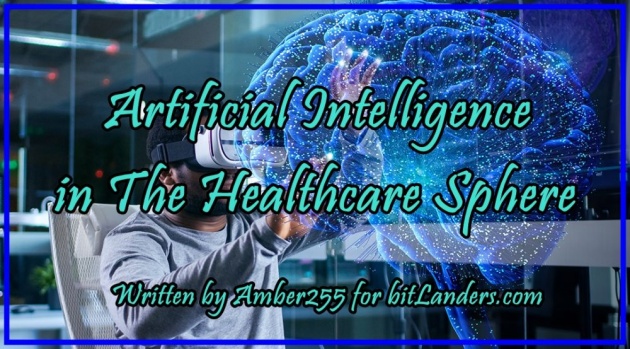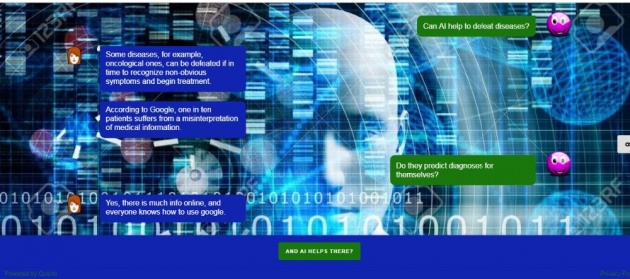
Artificial Intelligence in The Healthcare Sphere - Photo credit: medicine, edition by Amber255 via bitLanders
The industry of healthcare is considered as one of the fastest-growing industries in the world. Scientists predict that by 2030, personalized medicine using the augmented artificial intelligence system will already become a reality, and in 5 years, the first hospitals without doctors will appear.
Today, the medical industry has formed several trends that affect not only the work of large corporations, insurance companies, and clinics but also the lives of each of us.
Artificial intelligence is not a cybernetic mind, but a system of algorithms based on machine learning. Scientists believe that in the future, AI will free us from performing routine tasks in many areas. For example, artificial intelligence can have a major impact on medicine.
Smart medical products, services, and processes are already being developed by companies such as IBM, Google, Apple, Microsoft, General Electric, and many others: there are more than 800 of them. The most active are companies from the USA, Great Britain, and Israel.
If AI is already better than a young doctor, it will only get even stronger in the future.
Credit: ejinsight
30% of medical organizations will offer clients services based on artificial intelligence. In this article together with Querlo chat, I will tell you what intelligent systems can do today, and who is involved in their development.
The possibilities and application of AI in medicine
Artificial intelligence systems are already undergoing test applications and are successfully used in some Western countries.
Assisted systems with artificial intelligence became commercially available for teh use. So, image classification systems help the doctor to conduct high-quality diagnostics with minimal time. Before, the classification of medical images and the description of the images are done by radiologists, ultrasound specialists, etc. The analysis of images can already be carried out using artificial intelligence automatically.
Using artificial intelligence, patients at risk are identified. The doctor pays attention to these patients first. Thus, time is greatly saved, and the possibility of doctors' mistakes is minimized.

Artificial Intelligence in The Healthcare Sphere - Photo credit: querlo
Humanity regularly faces epidemics. Probably, many of us have heard about diseases as malaria, Ebola, and other outbreaks of diseases that are transmitted both by insects and through the water. The artificial intelligence system, which allows controlling and predicting epidemics, is in the status of clinical trials, but has already been used and works in Africa.
Information is collected using drones. Drones catch mosquitoes and analyze their DNA. Then they give a forecast, and we get to know where and when will the next epidemic occur - after which the risk territory is processed. Such systems prevent uncontrolled outbreaks of epidemics.
Further development of artificial intelligence will lead to the use of augmented artificial intelligence systems. These systems open up new possibilities for us.
By 2035, hospitals without doctors are expected. This is an example of autonomous artificial intelligence when the system itself makes decisions. Yes, of course, doctors will still be needed, but for some simple cases, the AI features described above will be available.
The Advent of AI in Healthcare - Video credit: youtube
Let's chat about how artificial intellect change healthcare, what it can do for our benefits, and what the systems with Ai we already can use.
The Querlo chat consist of the info on these topics:
1. How AI processes patient data? 2. How AI makes a diagnosis?
3. How AI selects Individual treatment? 4. How AI improves routine planning and automation?
5. How AI creates drugs? 6. Obstacles to AI and perspectives in healthcare:
a) Not fresh information; b) Non-communicative robots;
c) Smart machines need a smart approach; d) Price and value;
e) Hackers.
Chat with me on Artificial Intelligence in The Health Sphere ( the link opens chat in a full-screen mode):
Health systems are facing challenges worldwide. This is an increase in population and average life expectancy, which increases the number of people suffering from chronic diseases. This increases the costs of healthcare. Another problem is the lack of medical staff. Amid these challenges, healthcare is rapidly embracing digital technology. The amount of data stored in digital formats has grown hundreds and thousands of times. However, only a part of this data is used for the improvement of medical care's effectiveness, since they are not systematized. All this is valuable data to improve work efficiency, but they also often remain unused.
With the introduction of smart digital products and services, more and more data about their health is being collected by patients themselves. And gadgets are gaining more and more intelligent functions and capabilities for analyzing data and the ability to monitor the patient’s condition outside the walls of a medical institution. The world will have to decide how to make this data useful.
Artificial intelligence helps doctors and hospital administrators, as well as patients. It can increase the efficiency of work processes, help in making clinical decisions, expand the capabilities of patients in actively managing their health, and also ensure the management of the health of the population as a whole.
Based on the analysis of large databases, medical workers will be able to plan and preventive measures, reduce health risks, and costs.

Artificial Intelligence in The Healthcare Sphere - Photo credit: journal
On A Final Note
Today healthcare has no limits. It is able to provide the necessary medical care to any person at the right time and in the right place. Artificial intelligence and digital technologies play a leading role in its transformation, for which distances and time frames are insignificant. Their use gives tremendous opportunities to solve the urgent problems of the population in the field of health.
The experience shows that digitalization, the use of innovative technologies and artificial intelligence, in particular, contribute to improving the efficiency of healthcare and the quality of medical services, preserving the health of the nation as a whole.
************************************************************************
****************************************************************
******************************************
I invite you to participate in Bitlanders AI-themed Blogging and create your own AI-themed blogs and C-blogs on artificial intelligence theme:
bitLanders AI-themed blogging
After the successful launch of "The bitLanders C-blogging", conversational AI blogging by Querlo powered by IBM Watson and Microsoft Azure. bitLanders continues to support its joint venture Querlo. We believe in our mission to promote our future - Artificial Intelligence (AI) - and build AI conversations via blogging, here we are to introduce "bitLanders AI-themed blogging!"
Credit: quote from bitLanders
Always welcome back to check more Querlo Chat blogs on Artificial Intelligence theme.
***************************************************************************************************
Thank you for stopping by and reading my blog.
2019, All Rights Reserved.
You are very welcome to join Bitlanders and share your valuable knowledge and opinion.
***************************************************************************************************



